Great American Novel
The term Great American Novel (GAN) refers to a canonical novel that is thought to embody the essence of America. It is generally regarded as being written by an American and dealing in some way with the question of America's national character. The Great American Novel is considered America's equivalent of the national epic. The term was coined by John William De Forest in a 1868 essay. Although De Forest mentioned Uncle Tom's Cabin (1852) as a possible contender, he noted that the Great American Novel had most likely not been written yet. Writer Henry James shortened the term to GAN in 1880, and it has since evolved in meaning.
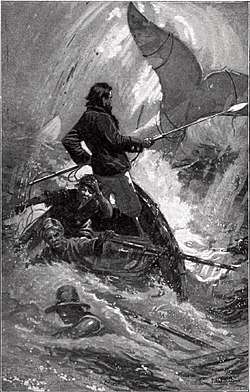
In modern usage, the meaning of the term is often figurative and represents a canonical piece of literature, making it a literary benchmark emblematic of what defines U.S. literature in a given era. Practically, many academics use the term to refer to a small number of books that have historically been the nexus of discussion, including Moby-Dick (1851), Adventures of Huckleberry Finn (1884), and The Great Gatsby (1924). However, there is no consensus on which novel, or novels, merits the title of Great American Novel.
History
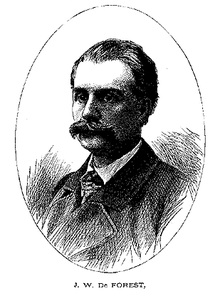
While fiction was written in colonial North America as early as the 17th century, it was not until a distinct U.S. identity developed in the 18th century that works considered American literature first appeared. The U.S. identity as a nation was reflected alongside the development of its literature.[1]
The term Great American Novel comes directly from the title of an 1868 essay[2] by American Civil War novelist John William De Forest. In the wake of the Civil War, De Forest claimed that "the Great American Poem" could only be created after the United States had experienced hundreds of years of democracy, however, he believed that the Great American Novel could be written much sooner.[3] As he wrote:
But the Great American Novel—the picture of the ordinary emotions and manners of American existence—the American "Newcomes" or "Miserables" will, we suppose, be possible earlier. "Is it time?" the benighted people in the earthen jars or commonplace life are asking. And with no intention of being disagreeable, but rather with sympathetic sorrow, we answer, "Wait." At least we fear that such ought to be our answer. This task of painting the American soul within the framework of a novel has seldom been attempted, and has never been accomplished further than very partially—in the production of a few outlines.[4]
He claimed that it would serve as "a tableau of American society."[5] De Forest criticized James Fenimore Cooper's The Last of the Mohicans (1826) and noted that it did not deserve to be called the Great American Novel. He expressed his admiration for the works of Washington Irving and Nathanial Hawthorne, but also claimed that they were not fit to be given the title.[6] The only novel that De Forest noted as a possible contender was Uncle Tom's Cabin (1852), which he hailed as "a picture of American life."[5]

In 1880, writer Henry James simplified the term with the initialism "GAN".[7] According to writer Martin Amis, immigrants, or "non-Americans", were critical in the evolution of the GAN. He points to the fact that many GAN authors were foreign born or of an immigrant background.[8] There are several different interpretations of what makes a GAN. Some say that it depicts a diverse group facing issues representative of "epochdefining public events or crises." This would include Moby Dick and Gravity's Rainbow.[9]
Although early GAN candidates were typically chosen by academics and scholars, the concept has opened up in recent years. Lawrence Buell, Professor of American Literature Emeritus at Harvard University, said that in the 21st century "the dream of the GAN is less in the hands of credentialed critics and scholars to determine than the result of a complex, messy interaction among them, readers at large, the literary entrepreneurialism of the writers themselves, the publishing and education industries, and self-accredited freelance journalists and bloggers."[10] Some have even suggested that the Marvel Comics by Jack Kirby and Stan Lee deserve the title.[5] Regarding this lack of consensus, critic A. O. Scott wrote:
"the Great American Novel... may be more like the yeti or the Loch Ness monster—or Sasquatch, if we want to keep things homegrown. It is, in other words, a creature that quite a few people—not all of them certifiably crazy, some of them bearing impressive documentation—claim to have seen."[11]
Notable candidates
| Year | Cover / title page |
Novel | Portrait | Author | Reasoning | Ref. |
|---|---|---|---|---|---|---|
| 1826 |  |
The Last of the Mohicans |  |
James Fenimore Cooper | Although De Forest critiqued Cooper's writing as boring, many consider The Last of the Mohicans to be the first GAN. It was influential in defining American literature and addresses themes which are common in later American works, including rugged individualism and freedom. | [12] |
| 1850 |  |
The Scarlet Letter | 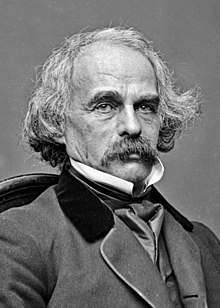 |
Nathaniel Hawthorne | Although De Forest specifically labelled The Scarlet Letter as not being worthy of the label of GAN, it is now widely included on most lists.[13] | [14][15] |
| 1851 | 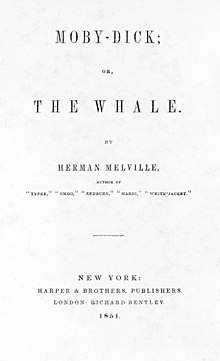 |
Moby-Dick | 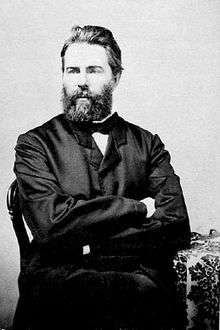 |
Herman Melville | Moby Dick has been called "the grandfather of all GANs."[16] | [17][18] |
| 1852 |  |
Uncle Tom's Cabin | 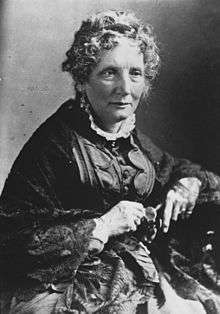 |
Harriet Beecher Stowe | [19][20] | |
| 1884 | Adventures of Huckleberry Finn | 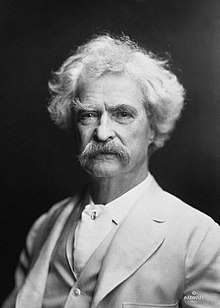 |
Mark Twain | The Adventures of Huckleberry Finn was one of the first American novels to utilize a regional vernacular.[21] In 1935, Ernest Hemingway stated that "All modern American literature comes from one book by Mark Twain called 'Huckleberry Finn'."[22] | [23][24][25] | |
| 1925 | .jpg) |
The Great Gatsby | 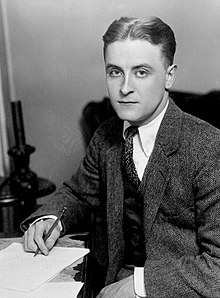 |
F. Scott Fitzgerald | [26][27] | |
| 1936 | .jpg) |
Absalom, Absalom! |  |
William Faulkner | [28][29] | |
| 1939 | .jpg) |
The Grapes of Wrath |  |
John Steinbeck | [30][31] | |
| 1951 | .jpg) |
The Catcher in the Rye | .jpg) |
J. D. Salinger | [32][33] | |
| 1952 | .jpg) |
Invisible Man | 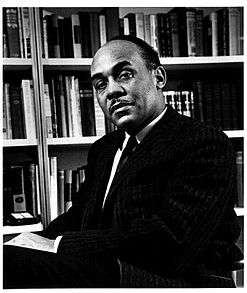 |
Ralph Ellison | The Invisible Man is considered the GAN due to its subject of racial issues in the United States. | [34][35] |
| 1960 | .jpg) |
To Kill a Mockingbird | .jpg) |
Harper Lee | Oprah Winfrey has described it as "our national novel." | [36][37] |
| 1973 | .jpg) |
Gravity's Rainbow |  |
Thomas Pynchon | Pynchon's postmodern novel of World War II is commonly cited as "the most important American novel" of the post-war era.[38] Its depiction of a democratic community had been compared to Moby Dick. | [39][40][41] |
| 1985 | .jpg) |
Blood Meridian | .jpg) |
Cormac McCarthy | The novel is noted for its portrayal of the consequences of manifest destiny for which it is labelled an anti-Western. | [42][43] |
| 1987 | .jpg) |
Beloved | .jpg) |
Toni Morrison | The novel is noted for its depiction of the psychological effects of slavery and racism. A. O. Scott remarked that "Any other outcome would have been startling, since Morrison's novel has inserted itself into the American canon more completely than any of its potential rivals."[44] | [44][45] |
See also
References
- Baym, Nina, ed. The Norton Anthology of American Literature. New York: W.W. Norton & Company, 2007. Print.
- DeForest, John (January 9, 1868), "The Great American Novel", The Nation, New York, retrieved October 11, 2010
- https://www.prospectmagazine.co.uk/magazine/end-of-the-dream-can-the-great-american-novel-survive
- DeForest, John (January 9, 1868), "The Great American Novel", The Nation, New York, retrieved October 11, 2010
- Zafarris, Jess (July 4, 2018). "The First Book to Ever Be Dubbed the "Great American Novel" Might Not Be the One You'd Guess". Writer's Digest. Retrieved June 15, 2020.
- https://www.writersdigest.com/be-inspired/the-first-great-american-novel
- Showalter, Elaine (February 20, 2014). "Can the Great American Novel survive?". Prospect. Retrieved June 15, 2020.
- Scholes, Lucy (October 21, 2014). "Can a 'Great American Novel' be written in French?". American Heritage Publishing. Retrieved April 20, 2020.
For at the very same time there is a list of widely accepted GANs – from... Gone With the Wind
- Elaine Showalter (February 20, 2014). "Can the Great American Novel survive?". Prospect.
- Buell, Lawrence (2014). The Dream of the Great American Novel. Cambridge, Massachusetts: Harvard University Press. p. 9. ISBN 9780674726321. OCLC 871257583.
- Temple, Emily (January 9, 2017). Literary hub https://lithub.com/a-brief-survey-of-great-american-novels/. Retrieved July 11, 2020. Missing or empty
|title=(help) - Italie, Hillel. "'Last of the Mohicans' was first great American novel". Retrieved October 14, 2015.
- Konnikova, Maria (June 29, 2012). "The Great American Novel". Slate. Retrieved June 15, 2020.
- Buell, Lawrence. "The Dream of the Great American Novel". Retrieved October 14, 2015.
There are, Buell says, four main types of potential Great American Novels. Nathaniel Hawthorne's The Scarlet Letter epitomises the first – a cultural 'master narrative', identified as such by the number of reinterpretations and imitations that follow in its wake.
- Latson, Jennifer (March 16, 2015). "Why The Scarlet Letter Was a Mixed Blessing for Its Author". Time. Retrieved May 17, 2020.
- https://harvardmagazine.com/2014/01/made-in-the-u-s-a
- Buell, Lawrence. "The Unkillable Dream of the Great American Novel: Moby-Dick as Test Case". American Literary History. 20 (1–2): 132–155. Retrieved October 26, 2010.
- Hubert Dreyfus - Melville's Moby Dick, retrieved November 4, 2019
- Fuller, Randall. "The First Great American Novel". Retrieved October 14, 2015.
- Fuller, Randall (May 2013). "The First Great American Novel". National Endowment for the Humanities. Retrieved May 15, 2020.
- Smith, Henry Nash; Finn, Huckleberry (1984). "The Publication of "Huckleberry Finn": A Centennial Retrospect". Bulletin of the American Academy of Arts and Sciences. 37 (5): 18–40. JSTOR 3823856.
- Ulin, David L. (November 14, 2010). "Celebrating the genius of 'Huckleberry Finn'". Los Angeles Times. Los Angeles. Retrieved May 14, 2020.
- Brown, Robert B. (June–July 1984). "One Hundred Years of Huck Finn". American Heritage Publishing. Retrieved December 10, 2011.
It was called the 'great American novel' as early as 1891 by the English writer Andrew Lang ...
- Mailer, Norman (December 9, 1985). "Huckleberry Finn, Alive at 100". The New York Times. New York City. Retrieved May 15, 2020.
- Willet, Megan (January 24, 2014). "25 American Classics Everyone Should Read At Least Once". Business Insider. Retrieved August 11, 2020.
- Emory Elliott et al. (eds.) (1991). The Columbia History of the American Novel. Columbia University Press. p. 323. "The Great Gatsby (1925), a work still frequently nominated as 'the great American novel' ..."
- Achenbach, Joel (March 20, 2015). "Why 'The Great Gatsby' is the Great American Novel". The Washington Post. Retrieved May 17, 2020.
- Hirsch, Arthur (November 16, 1997). "The real great American Novel: 'Absalom, Absalom!' Faulkner: His ninth novel, for its span, its revelation, its American essence, stands above all others in reaching for this literary absolute". The Baltimore Sun. Baltimore, Maryland. Retrieved September 21, 2010.
- https://harvardmagazine.com/2014/01/made-in-the-u-s-a
- Dana, Gioia. "The Grapes of Wrath Radio Show (interview with Richard Rodriguez) – Transcript". The Big Read. The National Endowment for the Arts. Retrieved September 22, 2010.
There hasn't been anything like this novel since it was written. And this is the great American novel that everyone keeps waiting for but it has been written now.
- Nixon, Rob. "The Grapes of Wrath". This Month Spotlight. Turner Classic Movies. Retrieved September 22, 2010. Nixon quotes John Springer, author of The Fondas (Citadel, 1973), a book about Henry Fonda and his role in film version of The Grapes of Wrath: "The Great American Novel made one of the few enduring Great American Motion Pictures."
- McGrath, Charles (January 28, 2010). "J. D. Salinger, Literary Recluse, Dies at 91". New York Times.
- Burke, Declan (July 13, 2011). "Sixty years and 65m copies on: Holden Caulfield and the great American novel". The Irish Times. Retrieved May 15, 2020.
- Giles, Patrick (September 15, 2002). "The Great American Novel". Los Angeles Times.
- https://www.independent.co.uk/arts-entertainment/book-of-a-lifetime-by-paul-gambaccini-invisible-man-by-ralph-ellison-a6684356.html
- Puente, Maria (July 8, 2010). "'To Kill a Mockingbird': Endearing, enduring at 50 years". USA Today.
It is Lee's only book and one of the handful that could earn the title of Great American Novel.
(Lee has since published a sequel, Go Set a Watchman.) - Scalzi, John (June 30, 2016). "The Great American Novel is 'To Kill a Mockingbird'". The Los Angeles Times. Los Angeles. Retrieved May 14, 2020.
- Buell, Lawrence (2014). The Dream of the Great American Novel. The Belknap Press of Harvard University Press. p. 426. ISBN 978-0-674-05115-7.CS1 maint: ref=harv (link)
- Buell 2014, pp. 426–427
- Weisenburger, Steven C. A Gravity's Rainbow Companion: Sources and Contexts for Pynchon's Novel. University of Georgia. pp. 1–2. ISBN 978-0-8203-2811-9.
- Deresiewicz, William (June 2014). "How the Novel Made the Modern World". The Atlantic.
- Dalrymple, William. "Blood Meridian is the Great American Novel". Reader's Digest.
McCarthy’s descriptive powers make him the best prose stylist working today, and this book the Great American Novel.
- Vann, David (November 13, 2009). "American inferno". The Guardian. Retrieved May 14, 2020.
A great American novel can only be anti-American, and Blood Meridian, like Toni Morrison's Beloved, focuses on our greatest shames
- Scott, A. O. (May 21, 2006). "In Search of the Best". The New York Times.
- Buell 2014, pp. 317–348
Further reading
- Buell, Lawrence (February 16, 2014). "American literature's holy grail: The hunt for the Great American Novel". Salon.
- Buell, Lawrence (2014), The Dream of the Great American Novel, Cambridge, Massachusetts and London: The Belknap Press of Harvard University Press, ISBN 9780674051157CS1 maint: ref=harv (link)
- Brown, Herbert R. "The Great American Novel." American Literature 7.1 (1935): 1–14.
- Knox, George. "The Great American Novel: Final Chapter." American Quarterly 21.4 (1969): 667–682.
External links
| Wikiquote has quotations related to: Great American Novel |
De Forest's essay on the Great American Novel